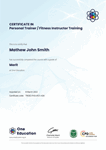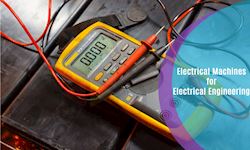Electrical Engineering - Electrical Machines
Accredited by CPD | Complete Video Lessons from Expert Instructor | Tutor Support Included
One Education
Summary
- Exam(s) / assessment(s) is included in price
- Tutor is available to students
Add to basket or enquire
Overview
In the current years, the introduction of power electronic drives with motors has led to new design opportunities. The increased integration of these drives and machines has triggered a quantum leap in productivity, efficiency and system performance. This theoretical course will give you a solid introduction to this rapidly expanding field under the guidance of industry experts.
The main focus of this course is to understand the magnetic field, electric machines and the principle of electrical generation. The voltage-current characteristics, voltage regulation of DC generators, torque-speed characteristics, speed regulation of DC motors and the generalised concepts of electromechanical energy conversion are included mainly in this course. Working principles, construction and operation of single-phase and three-phase transformers will be studied. This course includes AC machine fundamentals and the production of rotating magnetic fields. This course discusses the working principles, construction, and characteristics of transformers and equivalent circuits of synchronous generators, synchronous motors and induction motors, and Single phase and special-purpose motors in detail.
Gain a comprehensive knowledge of electrical machine systems and take steps towards a successful career! Enrol right now and get ready to experience an amazing venture!
Our Electrical Engineering - Electrical Machines course provides you with the abilities to:
- Get acquainted with the types of electrical machines and principles of electrical generation
- Acknowledge armature winding and the EMF equation
- Get in-depth knowledge of DC machines and DC motor and generator
- Determine the working principles, construction and operation of transformers
- Differentiate between Shell and Core type transformers
- Discover insulating materials and transformer oil
- Understand magnetic circuit
- Know about synchronisation of machines with grid and other fundamentals
- Learn about induction motors principles and applications
Expert Support
Dedicated tutor support and 24/7 customer support are available to all students with this premium quality course.
Key Benefits
- Learning materials of the Design course contain engaging voiceover and visual elements for your comfort.
- Get 24/7 access to all content for a full year.
- Each of our students gets full tutor support on weekdays (Monday to Friday)
CPD
Course media
Description
Course Curriculum:
Unit 1: Introduction to Electric Machines
- Module 1- Introduction
- Module 2- Types of Electric Machines and Principle of Electrical Generation
Unit 2: DC Machines
- Module 1- Importance and Construction of DC Machines
- Module 2- Armature Winding and EMF Equation
- Module 3-Solved Example 1
- Module 4-Solved Example 2
- Module 5-Solved Example 3
- Module 6-Solved Example 4
- Module 7-Separately Excited DC Machine
- Module 8-Shunt and Series DC Machines
- Module 9-Solved Example 1 on Separately Excited DC Machine
- Module 10-Solved Example 2 on Separately Excited DC Machine
- Module 11-Solved Example 3 on Shunt Generator
- Module 12-Solved Example 4 on Shunt Generator
- Module 13-Solved Example 5 on Series DC Generator
- Module 14-Types and Applications of Compound DC Motors
- Module 15- Torque-Speed Characteristics and Speed Control of Separately Excited DC Motor
- Module 16- Torque-Speed Characteristics of Series DC Motor
- Module 17-Solved Example 1 on Speed Control
- Module 18-Solved Example 2 on Speed Control
- Module 19- Starting of DC Machine
- Module 20- Armature Reaction in DC Machines
- Module 21-Losses in DC Machines
Unit 3: Construction of Transformers
- Module 1- What is a Transformer
- Module 2- Importance of Transformer
- Module 3-Iron Core of Transformer
- Module 4- Magnetic Circuit Inside Transformer
- Module 5- Windings of Transformer
- Module 6- Why are Windings Made of Copper
- Module 7- Classification of Windings
- Module 8- Insulating Material and Transformer Oil
- Module 9- Conservator of Transformer
- Module 10- Breather of Transformer
- Module 11- Bushings of Transformer
- Module 12- Tap Changer of Transformer
- Module 13- Cooling Tubes of Transformer
- Module 14- Buchholz Relay of Transformer
- Module 15- Explosion Vent
- Module 16- Methods of Cooling
- Module 17-Types of Transformers
- Module 18- Power Transformer and Distribution Transformer
- Module 19- Single Phase Core Type Transformer
- Module 20-Single Phase Shell Type Transformer
- Module 21- 3 Phase Core Type
- Module 22- 3 Phase Shell Type
- Module 23- Comparison between Shell and Core CSA
- Module 24- Comparison between Shell and Core Type
- Module 25- Notes
- Module 26-Video Explaining The Components in 3D and Real Life
Unit 4: Fundamentals of Magnetic Circuits
- Module 1- Introduction to Magnetic Circuits
- Module 2- Induced Emf and Current
- Module 3- Ampere Right Hand Rule
- Module 4- Magnetic Circuit and Important Definitions
- Module 5- Linear and Non Linear Materials
- Module 6-Flux Linkage and Reluctance
- Module 7- Analogy between Electric and Magnetic Circuits
- Module 8- Fringing Effect
- Module 9- Example 1 Magnetic Circuits
- Module 10- Example 2
- Module 11- Example 3
- Module 12- Application on Magnetic Circuit - Transformers
Unit 5: Theoretical Part on Transformers
- Module 1- Introduction to Transformers
- Module 2- Construction of Transformer
- Module 3-Theory of Operation
- Module 4- Ideal Transformer
- Module 5-Non Ideal Transformer
- Module 6- Effect of Loading on Transformer
- Module 7- Transformer Regulation
- Module 8- Transformer Losses
- Module 9- Transformer Efficiency
- Module 10- Transformer Rating
- Module 11- Question 1
- Module 12- Question 2
- Module 13- Question 3
- Module 14- Example 1
- Module 15- Voltage Relation of Transformer
- Module 16- Transformer Exact Equivalent Circuit
- Module 17- Concept of Refereeing
- Module 18- Approximate Equivalent Circuit
Unit 6: Synchronous Machines
- Module 1- Construction and Principle of Operation of Synchronous Generator
- Module 2- Principle of Operation of Synchronous Motor
- Module 3- Equivalent Circuit and Phasor Diagram of Non Salient Synchronous Machine
- Module 4-Solved Example 1 on Non Salient Machine
- Module 5-Solved Example 2 on Non Salient Machine
- Module 6-Solved Example 3 on Non Salient Machine
- Module 7- Solved Example 4 on Non Salient Machine
- Module 8-Solved Example 5 on Non Salient Machine
- Module 9-Solved Example 6 on Non Salient Machine
- Module 10- Equivalent Circuit and Phasor Diagram of Salient Synchronous Machine
- Module 11-Solved Example 1 on Salient Machine
- Module 12- Solved Example 2 on Salient Machine
- Module 13-Solved Example 3 on Salient Machine
- Module 14- Parallel Operation of Two Generators
- Module 15- Synchronization of Machine with Grid
Unit 7: Induction Machines
- Module 1- Construction and Theory of Operation of Induction Machines
- Module 2- Equivalent Circuit and Power Flow in Induction Motor
- Module 3- Torque-Speed Characteristics of Induction Motor
- Module 4- Solved Example 1 on Induction Motor
- Module 5-Solved Example 2 on Induction Motor
- Module 6-Solved Example 3 on Induction Motor
- Module 7-Solved Example 4 on Induction Motor
- Module 8-Solved Example 5 on Induction Motor
- Module 9- Methods of Speed Control of Induction Motor
- Module 10- Methods of Starting of Induction Motor
- Module 11-Solved Example on Motor Starter
- Module 12- Principle of Operation of Doubly Fed Induction Generator
- Module 13-Self Excited Induction Generator
Meet the Accreditation
CPD Quality Standards (CPD QS) accreditation assure the Electrical Engineering - Electrical Machines course training and learning activities are relevant, reliable, and upto date.
Course Assessment
To simplify the procedure of evaluation and accreditation for learners, we provide an automated assessment system. Upon completion of an online module, you will immediately be given access to a specifically crafted MCQ test. The results will be evaluated instantly, and the score will be displayed for your perusal. For each test, the pass mark will be set to 60%.
When all tests have been successfully passed, you will be able to order a certificate endorsed by the Quality Licence Scheme.
Exam & Retakes:
It is to inform our learners that the initial exam for this online course is provided at no additional cost. In the event of needing a retake, a nominal fee of £9.99 will be applicable.
Certification
Upon successful completion of the assessment procedure, learners can obtain their certification by placing an order and remitting a fee of £9 for PDF Certificate and £15 for the Hardcopy Certificate within the UK ( An additional £10 postal charge will be applicable for international delivery).
Who is this course for?
This course will benefit those new to the field of electrical rotating machines and drives and those desiring a refresher from the perspective of actual designs from practitioners. People who will find this course valuable include those working in the fields of:
- Appliance drives
- Precision motion control
- Renewable/alternative energy
- Electric/hybrid-electric vehicles
- Autonomous vehicle control
- Aerospace, marine, and military vehicles
- People already working in the relevant fields and want to polish their knowledge and skill
- Students studying mechanical engineering and electrical engineering
- People looking/preparing for job opportunities in the relevant fields
Requirements
This course is open to all, with no formal entry requirements.
Career path
Theoretical information and videos from this course can help learners advance in the following career paths:
- Electrical Engineer (Salary: £20,000 to £60,000)
- Electricity Generation Worker (Salary: £19,000 to £35,000)
- Electrical Engineering Technician (Salary: £24,000 to £43,000)
- Auto Electrician (Salary: £17,000 to £37,000)
- Engineering Operative (Salary: £18,000 to £25,000)
Questions and answers
Hi there Will this course help me get any job? Thanks. Regards
Answer:Dear Costa, This is a self-development online course and certified by the CPD which is recognised all over the world. We believe that this course will enhance your skills and will add value to your CV. However, we can not confirm any job guarantee as it completely depends on the employer. Stay Safe, Stay Healthy.
This was helpful.
Reviews
Currently there are no reviews for this course. Be the first to leave a review.
Legal information
This course is advertised on reed.co.uk by the Course Provider, whose terms and conditions apply. Purchases are made directly from the Course Provider, and as such, content and materials are supplied by the Course Provider directly. Reed is acting as agent and not reseller in relation to this course. Reed's only responsibility is to facilitate your payment for the course. It is your responsibility to review and agree to the Course Provider's terms and conditions and satisfy yourself as to the suitability of the course you intend to purchase. Reed will not have any responsibility for the content of the course and/or associated materials.



